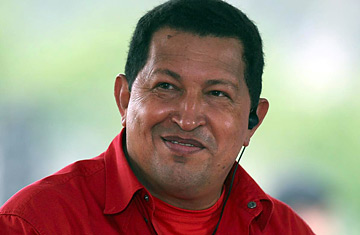
Venezuelan President Hugo Chavez
In spite of the demonstrations in the streets of Caracas, Hugo Chávez is quite likely to squeak through with a win in this weekend's referendum — legitimately. Nonetheless, critics say he may be morphing into a "democratator" — a democratically elected dictator.
Elections and plebiscites are a sort of a moral Teflon for Chávez against charges from enemies like the U.S. that he's another Latin despot. (And he has developed some expertise at them: he has been elected three times and beat back a recall referendum in 2004.) But despite Chávez's claims that he's forging "a more genuine democracy" that finally enfranchises the nation's majority poor, Venezuela hardly looks poised to become a showcase for the separation of powers. The National Assembly and Supreme Court are Chávez's virtual rubber stamps; and, while free speech admittedly is still intact in Venezuela, he has increasingly defined opposition to his ideological agenda as counter-revolutionary treason. When Chávez pal and former Defense Minister General Raúl Baduel — who helped put Chávez back in power after a failed coup attempt in 2002 — complained this month that the amendment package being voted on Dec. 2, including a proposal to eliminate presidential term limits, constituted a constitutional "coup d'etat," he was immediately branded a traitor.
Given how profoundly Chávez has altered hemispheric politics in recent years, it's not surprising that he seems to be leading the so-called democratator trend in the region. In Bolivia and Ecuador, left-wing Presidents and Chávez allies Evo Morales and Rafael Correa are hammering out new Constitutions that would let them run for re-election indefinitely. In Nicaragua, President Daniel Ortega, hoping to relive the broad Marxist powers he enjoyed as President in the 1980s, is ruling virtually by decree. In Argentina, many suspect that the leftist husband-and-wife team of outgoing President Nestor Kirchner and President-elect Cristina Fernández de Kirchner intend to alternate in the Casa Rosada (the Pink House, or presidential palace) well into the next decade if not beyond. And in Colombia, supporters of conservative President and staunch U.S. ally Alvaro Uribe are clamoring to change their magna carta to give him a third term (which he has yet to say he'd reject) if not more. (This week's feud between Chavez and Uribe is a disheartening preview of democratators at each other's throats.)
A decade after most of Latin America returned to democratic elections, it was thought by now the region would also be governed more completely by democratic institutions. Instead, says Robert White, head of the Center for International Policy in Washington, D.C., and a former U.S. ambassador in Latin America, "Personalismo is alive and well," referring to the region's historical penchant for protracted personal rule. A chief reason, White notes, is that traditional democracy and capitalism have largely failed to improve Latin America's gaping inequality and frightening insecurity — so voters have largely decided to "cling as long as possible" to leaders like Chavez and Uribe who they feel can. "The failure of democratic institutions like judiciaries has led us back to personalismo, this time lightly fettered by constitutional structures," says White. The U.S. has been complicit, he adds, by regularly and rather lazily sending signals to Latin America that free elections alone are enough to build democracies.
Chávez backers of course reject the democratator label. "Yes, the intent of socialism is that the collective interest predominate over individual interests," says Haiman El Troudi, director of the Miranda Center in Caracas, a policy research think tank set up by the government. "But if our agenda were Stalinist we would have imposed it by now. Instead we're subjecting these reforms to an election — totalitarian states don't do that." Bernardo Alvarez, Venezuela's ambassador to the U.S., concurs: "We're trying to create institutionality in Latin America precisely because its present institutions don't function." As for unlimited presidential re-election, Alvarez notes that Chávez will still be subject to elections to remain in power — and he adds wryly that the U.S., "where the Bush and Clintons families have been alternating power since 1989," is in no position to lecture.
Observers like White agree the U.S. will have to patiently resign itself to Latin America's democratator phenomenon for now. "In the end it's the Latin Americans themselves who have to come to the understanding that even if they can't trust their judicial and legislative institutions," says White, "the lack of them is leading to an executive absolutism that won't be good for them, either." With reporting by Jens Erik Gould/Caracas
